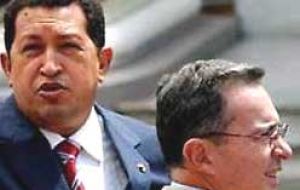MercoPress. South Atlantic News Agency
Uribe/Chavez “fraternal” summit promises new start
 Chavez - Uribe shake hands next Friday
Chavez - Uribe shake hands next Friday Venezuela and Colombia presidents Hugo Chavez and Alvaro Uribe will be meeting Friday in Paraguaná, 500 kilometers from Caracas for a new start in bilateral relations following months of accusations and recriminations.
Mr. Uribe arrives with unprecedented support at home, 90%, after Colombian forces liberated the former presidential candidate Ingrid Betancourt and 14 other hostages while the Venezuelan leader is overwhelmed by domestic problems. The meeting at an oil refinery in Venezuela is meant to reactivate the bilateral economic agenda, including pending energy projects, between the neighboring countries that share 6 billion US dollars annual trade. The program includes a private meeting, lunch, a joint Declaration and a transport agreement followed by a press conference. On confirming the visit last week Chavez referred to Uribe as "my brother", even admitting that very harsh epithets had been said. He even went as far as criticizing the Venezuelan Communist Party for organizing a rally against Uribe. "I'm inviting the president of Colombia to shake hands, to seek integration and respecting particularities, we are forced to reach an understanding with the government of Colombia. I'm head o state and as such must act", he underlined. In effect the need for cooperation on trade, immigration, cross-border guerrilla violence and drug-trafficking gives both men reason to find ways to get along in spite of the ideological distrust. Uribe has threatened to take Chavez to court for supporting the FARC rebels and the leftist Venezuelan has called his counterpart a liar and US lackey. Relations went sour late last year when Uribe fired Chavez from his role mediating the release of FARC rebel-held hostages. Chavez stole the international spotlight anyway by negotiating the release of six captives in early 2008. But Chavez later found himself on the defensive, having to deny giving money to the rebels after Colombia said it found such evidence on a guerrilla leader's computer. The balance tilted further in Uribe's favor last week with Betancourt's rescue, which highlighted the success of his hard-line military policy compared with Chavez's enthusiasm for talks with rebels as peace partners. The Venezuelan leader, who had previously called for more recognition for the guerrillas whom he called combatants and refused to label them terrorists (as have the US and the EU), last month urged them to unconditionally release their hostages and end the war. Chavez also used to refer to the hostages as "retained". Chavez faces mid term elections this year and although still the leading figure in Venezuela his followers are fed up with inflation, corruption, food scarcity and rampant crime. Last December he lost a referendum that asked voters if they wanted to allow him to seek re-election as many times as he wants. "The presidential summit will help to establish a frank, open dialogue" said Venezuelan Foreign Affaire minister Nicolas Maduro, "re-encountering from a political point of view and reestablishing a constructive dialogue" with Colombia.




Top Comments
Disclaimer & comment rulesCommenting for this story is now closed.
If you have a Facebook account, become a fan and comment on our Facebook Page!